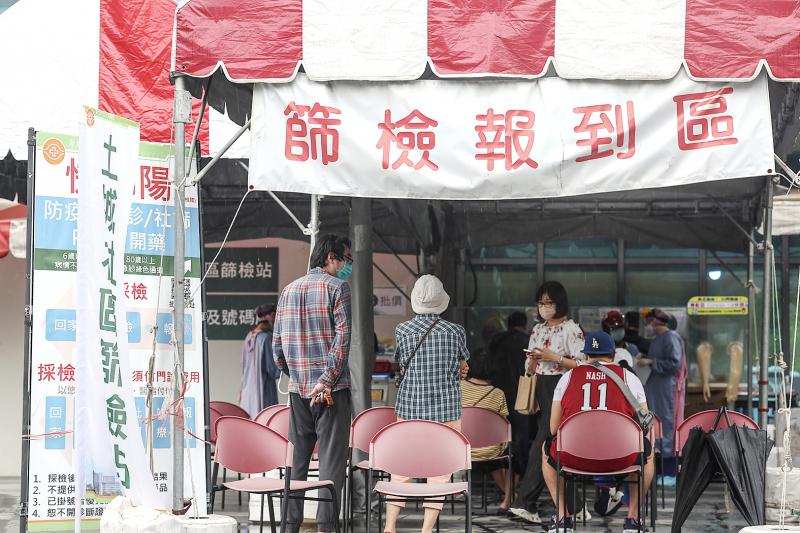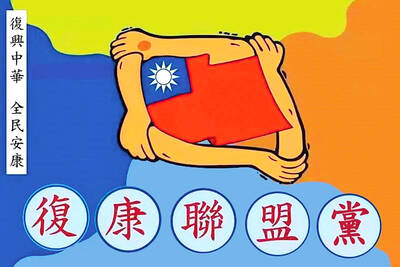As of Monday, total compensation by non-life insurance companies to policyholders of COVID-19 insurance surpassed NT$20 billion (US$669.9 million), suggesting a loss ratio of nearly 500 percent, data released by the Financial Supervisory Commission showed.
A loss ratio — the ratio of losses to premiums paid — of more than 100 percent means an insurance product is not making money.
As of Monday, COVID-19 insurance policy compensation claims had reached NT$20.5 billion, an increase of NT$5.62 billion, or 37 percent, from the previous week.

Photo: CNA
The money was paid out to 571,000 policyholders, up 35 percent from a week earlier, data from the commission showed.
COVID-19 insurance premiums increased 1.7 percent from NT$4.06 billion a week earlier to NT$4.13 billion, as 4.45 million COVID-19 insurance policies had been sold to consumers, the data showed.
The loss ratio of COVID-19 insurance products stood at 498 percent, meaning that compensation was 4.98 times the premiums from sales of such policies.
As of Monday, 12.8 percent of all COVID-19 insurance policyholders had received compensation, the commission said.
The commission has approved eight insurers’ applications to use NT$9.94 billion in special reserves to write off their losses.
They are Fubon Insurance Co (富邦產險), Cathay Century Insurance Co (國泰世紀產險), Tokio Marine Newa Insurance Corp (新安東京海上產險), CTBC Insurance Co (中國信託產險), Chung Kuo Insurance Co (兆豐產險), Hotai Insurance Co (和泰產險), MSIG Mingtai Insurance Co (明台產險) and Nan Shan General Insurance Co (南山產險).

AIR DEFENSE: The Norwegian missile system has proved highly effective in Ukraine in its war against Russia, and the US has recommended it for Taiwan, an expert said The Norwegian Advanced Surface-to-Air Missile Systems (NASAMS) Taiwan ordered from the US would be installed in strategically important positions in Taipei and New Taipei City to guard the region, the Ministry of National Defense said in statement yesterday. The air defense system would be deployed in Taipei’s Songshan District (松山) and New Taipei City’s Tamsui District (淡水), the ministry said, adding that the systems could be delivered as soon as the end of this year. The US Defense Security Cooperation Agency has previously said that three NASAMS would be sold to Taiwan. The weapons are part of the 17th US arms sale to

SERIOUS ALLEGATIONS: The suspects formed spy networks and paramilitary groups to kill government officials during a possible Chinese invasion, prosecutors said Prosecutors have indicted seven retired military officers, members of the Rehabilitation Alliance Party, for allegedly obtaining funds from China, and forming paramilitary groups and assassination squads in Taiwan to collaborate with Chinese troops in a possible war. The suspects contravened the National Security Act (國家安全法) by taking photos and drawing maps of key radar stations, missile installations and the American Institute in Taiwan’s headquarters in Taipei, prosecutors said. They allegedly prepared to collaborate with China during a possible invasion of Taiwan, prosecutors said. Retired military officer Chu Hung-i (屈宏義), 62, a Republic of China Army Academy graduate, went to China

INSURRECTION: The NSB said it found evidence the CCP was seeking snipers in Taiwan to target members of the military and foreign organizations in the event of an invasion The number of Chinese spies prosecuted in Taiwan has grown threefold over a four-year period, the National Security Bureau (NSB) said in a report released yesterday. In 2021 and 2022, 16 and 10 spies were prosecuted respectively, but that number grew to 64 last year, it said, adding that the Chinese Communist Party (CCP) was working with gangs in Taiwan to develop a network of armed spies. Spies in Taiwan have on behalf of the CCP used a variety of channels and methods to infiltrate all sectors of the country, and recruited Taiwanese to cooperate in developing organizations and obtaining sensitive information

BREAKTHROUGH: The US is making chips on par in yield and quality with Taiwan, despite people saying that it could not happen, the official said Taiwan Semiconductor Manufacturing Co (TSMC, 台積電) has begun producing advanced 4-nanometer (nm) chips for US customers in Arizona, US Secretary of Commerce Gina Raimondo said, a milestone in the semiconductor efforts of the administration of US President Joe Biden. In November last year, the commerce department finalized a US$6.6 billion grant to TSMC’s US unit for semiconductor production in Phoenix, Arizona. “For the first time ever in our country’s history, we are making leading edge 4-nanometer chips on American soil, American workers — on par in yield and quality with Taiwan,” Raimondo said, adding that production had begun in recent